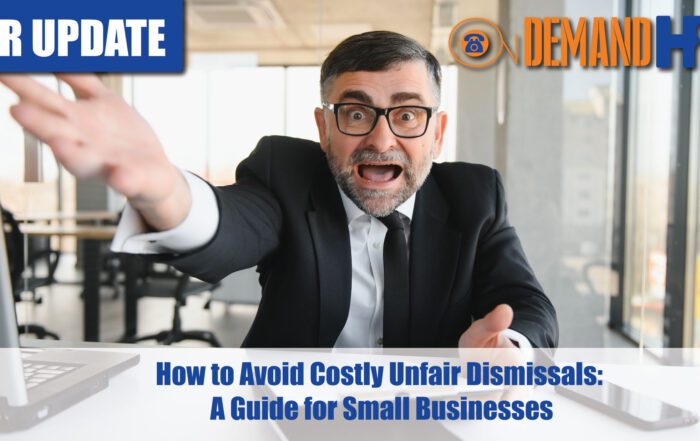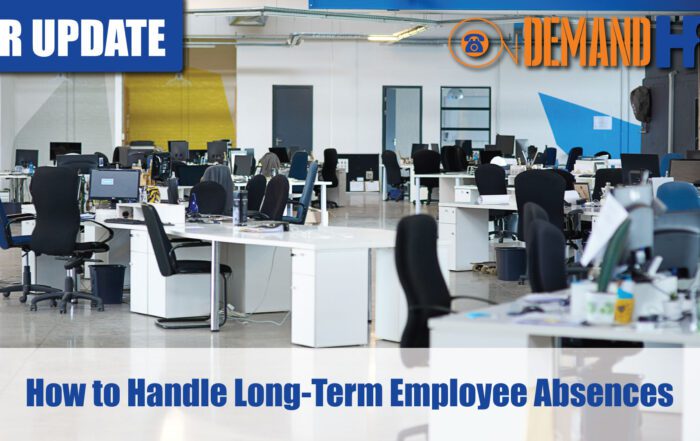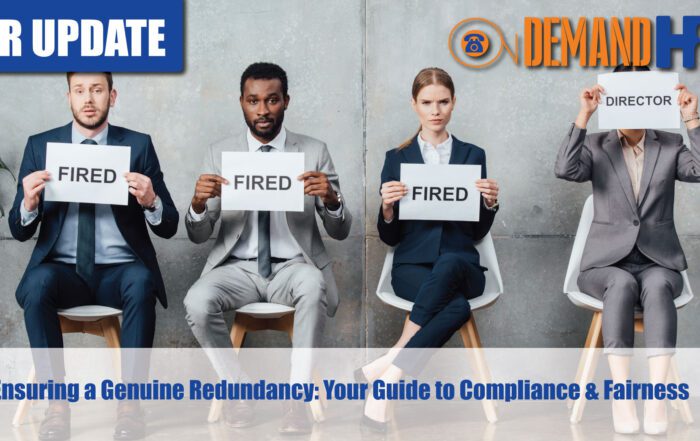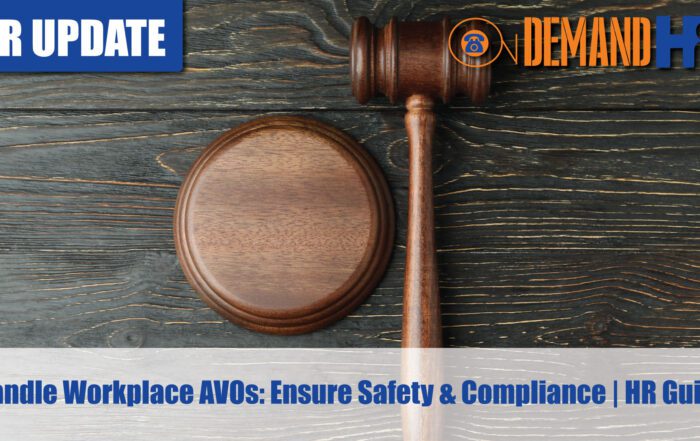Managing Workplace Bullying, Discrimination & Sexual Harassment Complaints
In Episode E8 of HR Fridays where Clint will discuss how to manage workplace bullying, discrimination and sexual harassement complaints should they occur in your business.
Please see below for a full transcript of the video
Share the HR or workplace relations challenge facing your business and one of our experienced consultants will be in touch within 24 hours with a strategic action plan or discover the best strategy yourself by accessing out free online training library.
Transcript
Clint Indrele 0:17
Good afternoon or good morning ladies and gentlemen. Welcome to HR Fridays here with Clint Indrele Managing Director of On Demand HR. Every Friday at 11:30am, we have a specific topic that we are going to present to you. And this is all about providing advice and value for businesses and other organizations to assist them with their HR and Workplace Relations affairs. Let us know of any topics of interest that you might like in the future. Please let us know anything in particular that you think would be useful for your business or just more generally, please interact with this as well during the exchange. Let us know that if you’ve got any particular questions about this topic, we’re happy to answer any of those questions on the fly. The whole purpose of this HR Friday’s segment is to provide businesses and other organizations with advice, which is based on reality. We’ve been in the Fair Work Commission many times as a paid agent, we’ve dealt with many workplace investigations in our time, we’ve dealt with the Fair Work Ombudsman many times. This allows us to provide real perspective, not just theory based on what lawyers have told certain other HR consultants or not based on scare tactics either. So www.ondemandhr.com.au
Clint Indrele 1:31
Today’s topic, we’re going to talk about workplace bullying, harassment and discrimination complaints, and how to handle those complaints. And for those who aren’t already aware, On Demand HR has a training product that we have available for businesses at a very, very low cost online training module for employees to complete, you know, the essentials on workplace bullying, harassment and discrimination for compliance purposes. But without further ado, let’s get into the presentation. And let’s talk today about compliance and how to handle complaints.
Clint Indrele 2:01
So, certainly, first of all, and I think that the first key thing is that when we’re looking at a complaint, and this is sort of what I hear with a lot of other HR consultants, and a lot of other advice is I’ll just report the complaint immediately to management. And I’m not convinced that that’s actually the best way to go about handling a complaint or an issue in the workplace. I think the first thing that the individual should always ask themselves and businesses should also even think about discussing with the complainant or potential complainant is, is self action appropriate? is it reasonable and safe for that person to simply speak to the respondent or the perpetrator of whatever behavior it is, and talk to them about the fact that their behavior, you know, has been not well received, or is unacceptable, and put that to that person, as, you know, a proposition. And hopefully, that will go some part of the way or potentially all the way to resolving the issue. And, yeah, this is something that’s not done enough, and can often be the best and most efficient way to resolve the grievance, yes, it’s going to be a little bit uncomfortable in that initial discussion, but what’s going to be more uncomfortable? going through and having that, you know, hard discussion once or going through a long drawn out investigation process, potentially, with other parties involved, potentially with, you know, suspensions, potentially, with various other witnesses being called in to give information. I tend to think that the latter is more uncomfortable than the former. So selg action should always be something that is going to be considered by candidates. And certainly when I do any workplace investigations, I always ask the complainant, whether or not there is anything that they think, you know, that they have done prior to making their complaint, have they spoken to the individual, have they given them the opportunity to essentially, you know, resolve it between the two of them.
Clint Indrele 4:06
So I think the next thing that you’d have, then obviously, or the other the next step, if you like if self actions not appropriate, or if self action hasn’t worked successfully, then obviously another option is to look at making a formal complaint. So making a complaint to either your direct manager, senior manager or HR. And then it’s up to the organization to consider Well, what sort of immediate action is required. So is this complaint serious enough to warrant some sort of suspension, or some sort of special leave being granted to one or both of the parties in order for the process to take its course.
Clint Indrele 4:42
So I think the other thing to understand early in a complaint as well is what type of complaint is it? So is it a bullying, harassment complaint, a discrimination complaint? Is it a combination of those three things? Or is it another complaint entirely? One thing I do often see is that sometimes complainants make complaints about what I would call either operational matters or pay and conditions matters. And in my view, I don’t think that operational matters or pay and conditions matters necessarily require any investigation Because ultimately, if a person has a grievance about the operations of the business, or they’re having a grievance about, you know, their pay and conditions, well, then those are matters that ultimately can be dealt with outside of a investigative process. And where, well, you know, the individual doesn’t necessarily always have the prerogative to really determine what is acceptable and what isn’t acceptable, I think the concepts of bullying, harassment and discrimination are, you know, a fairly, you know, well understood, and obviously, individuals in management, you know, or, you know, superiors or, or colleagues or subordinates, as supposed to, you know, essentially conduct themselves in a way that would not be, I guess, in contradiction to the general operation of those concepts.
Clint Indrele 6:09
Where you have operational issues where you have pay and conditions matters, if someone’s complaining about an operational decision that a manager is made, well, it may not necessarily even be appropriate for that person to be commenting on such a decision. And nor would it be necessarily appropriate for someone to complain about pay and conditions provided that the award minimums and those sorts of things are met.
Clint Indrele 6:31
So we had a complaint actually, with a client the other day where the looking through the complaint, it says it says bullying complaint. But ultimately, when you look through the the information that’s provided in the document, it was actually a complaint about pay and conditions. And what we actually recommended to the client is that they should go away, and actually consider providing the employee with a simple response, saying, These are your pay and conditions, grievances, if you like. And these are how these matters will be resolved without actually any investigation being required or being necessary. So again, very important to understand the nature of the complaint early, and then that formulates the decision on how the investigation should be conducted. Well, first of all, is one required and how it will be conducted. So do we have a person internally that’s competent enough to conduct this investigation? And that is a big if, because most of the time internal persons in the organization unless they’ve had some degree of experience around investigations, at generally, they can be quite lacking in able to competently resolve one of these matters.
Clint Indrele 7:36
The second question is, should we engage an external party? On Demand HR has conducted over 100 workplace investigations, we’ve we’ve appeared and had our findings tested in the Fair Work Commission. And certainly those findings on that particular occasion were found to be fair, reasonable, equitable and thorough. So again, for those who aren’t sure, we can offer that particular service. But the other part of it is that regardless of who conducts the investigation, you need to decide who needs to be interviewed during the investigation. And this is an important step, because obviously, you’ve got the complainant, and your respondant. But what I often find the complainant and the respondent does is they then try and gather a set of what I call fan clubs to try and support their position. And I take the view that Well, unless the person that they are requesting or suggesting should be interviewed has information that is directly relevant to the complaint, I would only interview those persons who have information that’s directly relevant to the complaint, I’m not interested in getting a character reference on why someone’s a good manager or why someone’s a bad manager. And unless I see that there’s a really, really good reason to do that. So most of the time, I’m looking for witnesses or third parties that are directly relevant to the complaint. So it should be always up to the person conducting the investigation to decide who is interviewed, rather than the parties dictating who was interviewed.
Clint Indrele 8:57
The other thing that, again, internal complaints, often in organizations who do this themselves are often very weakened, is that sometimes they come to a conclusion. And that basically, the situation is not entirely clear. So they get to the point where, okay, there’s been investigation, there’s been some allegations made. And you know, it might be one of those situations where there’s a one on one exchange, there’s no other witnesses. And it’s very difficult to form a conclusion. But the most important thing is to advise all parties of the outcome of the complaint, even if it is unclear. So if you can’t make a conclusion on the allegations, then the conclusion should be exactly that, that the allegations are not substantiated, because there is insufficient evidence and that is okay. If there is insufficient evidence, and there is often the case that there is insufficient evidence, then simply make that conclusion and put that to the complainant and the respondent in the outcome letters. So very important step in all of that.
Clint Indrele 10:00
I guess as a final point on internal complaints, and doing these things, look, certainly an investigative report is something that we would produce if we were conducting an external complaint. Internally, look, you don’t necessarily need to produce an investigation report, I think an outcome letter would be the minimum standard that you would expect in terms of completing such an investigation. However, obviously, if matters do go external, you may be questioned on you know, what types or how you can do certain findings and things like that.
Clint Indrele 10:31
The other the other question that we get a lot is, well, what about signed statements? I personally hate signed statements, because what you end up with in signed statements is you end up with horse trading, on what a person said, in an interview, the day after, so you ultimately have an interview with someone you produce a record of that interview. And then, you know, during the course of an interview, sometimes people make concessions about what actually happened. And, and again, and, you know, it can often be the case when someone says something under pressure, or, you know, concede something in an investigative interview. But then if they’re presented with a statement, or some sort of, you know, record of the interview, the next day, they say, Oh, well, no, I didn’t say that. And then you say, Well, you did say that. And then I say, Well, I didn’t mean that, I’m not going to sign this. So you end up with a fairly, you know, a, what I’d like to say a bastardized version of the interview, and why it’s always my preference to have a recorded interview, either audio recording or a zoom video recording, and then that recording can be transcribed. So there’s absolutely no doubt whatsoever. That the words that were said in the interview, again, you don’t always need to transcribe, I only recommend transcribing, if you’re off to some sort of external action, I think just taking the recording to begin with can be sufficient.
Clint Indrele 11:49
And in terms of employees or people who may not want to be recorded or may refuse recording, there’s two options with this. One option is to say to them, well, this is our standard process. And if you don’t follow this process, then the interview will take significantly longer, because I will need to take verbatim notes of every response that you give. And every question that I asked, that’s one way of breaking down a person’s resistance on that front. The second way of breaking it down is offering to provide a copy of the transcript or the recording, that is a second way of breaking it down again, I prefer to offer the copy of the transcript. And and the third way of breaking it down is simply saying to the individual, this is our method of investigation. It’s a reasonable lawful directive, and we request you to comply with this particular process. So that is there’s three ways of us approaching that particular issue.
Clint Indrele 12:38
In terms of external action. So look, this is sort of a situation that arises either when there’s been failed self action or a failed internal complaint. And when I say failed, it’s generally when it hasn’t been, you know, well conducted, or the organization hasn’t been clear on its on its outcomes or conclusions on a particular issue. The two most common, I guess tribunals where external actions go to would be the Fair Work Commission, and the Australian Human Rights Commission. Typically, you get a lot more matters in the Fair Work Commission then the Australian Human Rights Commission. They both have a mediation or conciliation process prior to any kind of determination of the facts, so to speak. Both of these are also no cost jurisdictions, so each party must meet their own costs. And that’s important for a complainant to understand because you are going to go external to the Fair Work Commissioner or AHRC, and you’re planning on gauging a lawyer or some other paid agent, then remember that any costs incurred with them, you’re going to have to incur yourself. So in order for it to be worth it, you really want to make sure that you’ve exhausted all those other avenues. And you know, you have real clarity on what sort of an outcome that you’re seeking. So, again, external actions, there are a few different ways in which this can be communicated to the commission, you have anti bullying applications, which apply only if a person is still employed with an organization doesn’t you cannot make an anti bullying application to the commission if you are no longer employed, you can lodge an unfair dismissal, which could actually have potentially the allegation that you were forced to resign from your employment or an employee was forced to resign from their employment because of conduct of the business, which could be you know, the conduct of another employee or lack of investigation or any of those types of things.
Clint Indrele 14:21
There is general protections, applications that can also sometimes catch bullying situations depending upon the circumstances. And the AHRC also has a range of other complaints that it takes in relation to these issues, typically the AHRC it’s really interesting because often what we see is that once a complaint is lodged, the employer doesn’t become aware of it for quite some time, it can often be six to nine months after the complaint is made. We’ve had a couple situations where clients have received a documents from the AHRC you know, six to nine months later and you sort of look at this and go Wow, I didn’t know this complaint was made so long ago, but there is to the AHRC’s credit There is a there is a method of at least assessing the complaint prior to kind of putting it on for a mediation or for a response, whereas typically with the Fair Work commission, everything is accepted. And it just becomes a scheduling process straightaway. So that’s just a little about the tribunal considerations.
Clint Indrele 15:18
And yeah, good to see we’ve got a few people actually on the line today, you know, listening to this, and if there’s any other questions in the next minute or so I’ll be more than happy to answer them before we wrap up.
Clint Indrele 15:28
But again, for those organizations that are not sure what to do in the workplace, bullying, discrimination and sexual harassment space, first thing is to have clarity around your policies on these things, and making sure you define these things properly, having a good solid grievance procedure, as well, seeking external help to manage complaints if necessary. And obviously, you know, On Demand, HR is an option that is there for organizations on that.
Clint Indrele 15:53
The other thing that we do have, and I mentioned at the start of the presentation is we also have access, we also have developed a training product, which is a workplace bullying, harassment and discrimination training module, it deals with compaints, it deals with definitions, it’s a great tool for an organization to keep their employees trained and up to date, should you ever be questioned about what training you’re doing by WorkCover or any other organization, often having face to face facilitators is hard got to bring one in, then you bring new staff on, then you bring another one in. And that can be a very costly exercise. So this is a really cheap and affordable way of going about the training. And you’re looking at, you know, depending upon employee sizes, but generally $50 per employee, or less, depending upon the scale of how many employees are in your business. So that’s pretty much it for workplace bullying, discrimination and sexual harassment complaints today. Once again, my name is Clinton Indrele, Managing Director of On Demand HR, I hope you enjoyed this series of HR Fridays, we’re gonna continue to roll these out every every single week, and try and come up with some interesting material for businesses and organizations to have a look at and just final time, any questions www.ondemand.com.au. Thanks very much, everyone. Have a great weekend.






